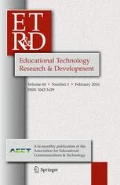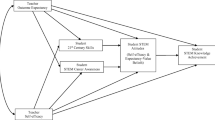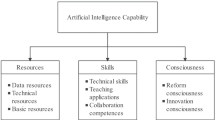Abstract
Faculty use of technology is a critical issue in higher education; administrators and students are expecting faculty instruction to incorporate technology in classroom and distance education. Competition is demanding technologically proficient graduates for schools and colleges. Research indicates that computer self-efficacy (CSE) may be one determinant of who uses technology and who does not. A survey of education faculty at the Lebanese University in Beirut, Lebanon, conducted in 2006, revealed varying degrees of CSE; of 127 respondents, 14 had low levels of CSE; 68 were at a moderate level, and 45 self-evaluated themselves to have high CSE. Although other barriers may deter the implementation of technology in teaching, strategies and techniques for increasing CSE should be developed. For those with low CSE, special attention must be given to enhancing their levels of CSE.
Similar content being viewed by others
References
Al-Alwani, A. E. S. (2005). Barriers to integrating information technology in Saudi Arabia science education. Unpublished dissertation, University of Kansas.
Antonacci, D. M. (2002). Integrating technology into instruction in higher education. Retrieved October 15, 2005, from http://www.associations.missouristate.edu/highered-web/attachments/IS-TechnologyIntegrationinHigherEducation.pdf.
Bandura, A. (1982). Self-efficacy mechanisms in human agency. American Psychologist, 37, 122–147.
Bandura, A. (1986). Social foundations of thought and action: A social cognitive theory. Englewood Cliffs, NJ: Prentice Hall.
Brown, A. H., Benson, B., & Uhde, A. P. (2004). You’re doing what with technology? An expose on “Jane Doe” College Professor. College Teaching, 52(3), 100–104.
Cassidy, S., & Eachus, P. (2002). Developing the Computer User Self-Efficacy (CUSE) Scale: Investigating the relationship between computer self-efficacy, gender and experience with computers. Journal of Educational Computing Research, 26(2), 133–153.
Compeau, D. R., & Higgins, C. A. (1995). Computer self-efficacy: Development of a measure and initial test. MIS Quarterly, 19(2), 189–211.
Compeau, D., Higgins, C. A., & Huff, S. (1999). Social cognitive theory and individual reactions to computing technology: A longitudinal study. MIS Quarterly, 23(2), 145–158.
Dunlap, J. C. (2005). Problem-based learning and self-efficacy: How a capstone course prepares students for a profession. Educational Technology Research and Development, 53(1), 65–85.
Dusick, D. M. (1998). What social cognitive factors influence faculty members’ use of computers for teaching? A literature review. Journal of Research on Computing in Education, 31(2), 12–137.
Faseyitan, S., Libii, J. N., & Hirschbuhl, J. (1996). An inservice model for enhancing faculty computer self-efficacy. British Journal of Educational Technology, 27, 214–226.
Gilmore, E. (1998). Impact of training on the information technology attitudes of university faculty. Unpublished doctoral dissertation, University of North Texas, Denton, TX.
Groves, M. M., & Zemel, P. C. (2000). Instructional technology adoption in higher education: An action research case study. International Journal of Instructional Media, 27(1), 57–65.
Hasan, B. (2003). The influence of specific computer experiences on computer self-efficacy beliefs. Computers in Human Behavior, 19, 443–450.
Hirschbuhl, J., & Faseyitan, S. O. (1994). Faculty uses of computers: Fears, facts and perceptions. T H E Journal, 21(9), 64–65.
Kagima, L. K., & Hausafus, C. O. (2000). Integration of electronic communication in higher education: Contributions of faculty computer self-efficacy. The Internet and Higher Education, 2(4), 221–235.
Lebanese Association for Educational Sciences (LAES) (2000). Retrieved October 15, 2005, from http://www.laes.org.
Leggett, W. P., & Persichitte, K. A. (1998). Blood, sweat, and TEARS: 50 years of technology implementation obstacles. TechTrends, 43(3), 33–36.
Majdalani, R., Stockman, M., & Osta, I. (2005). Wireless local area network WLAN: The “wireless campus project” at the Lebanese American University. In I. Osta (Ed.), Education and information technology in the Arab countries: Issues and trends (pp. 463–478). Beirut Lebanon: Lebanese Association for Educational Studies.
Masri, S. (2005). Realizing a vision of country-wide computer-based education: A success story from Jordan. In I. Osta (Ed.), Education and information technology in the Arab countries: Issues and trends (pp. 399–410). Beirut Lebanon: Lebanese Association for Educational Studies.
Murphy, C. A., Coover, D., & Owen, S. V. (1989). Development and validation of the Computer Self-Efficacy Scale. Educational and Psychological Measurement, 49, 893–899.
Olivier, T. A., & Shapiro, F. (1993). Self-efficacy and computers. Journal of Computer-Based Instruction, 20(3), 81–85.
Pajares, F. (1996). Self-efficacy beliefs in academic settings. Review of Educational Research, 66(4), 543–578.
Pajares, F. (2002). Overview of social cognitive theory and self-efficacy. Retrieved November 29, 2004, from http://www.emory.edu/EDUCATION/mfp/eff.html.
Reigeluth, C. M. (1994). Systemic change in education. Englewood Cliffs, NJ: Educational Technology Publications.
Scholder, E. P. (1987). The impact of self-efficacy and performance satisfaction on resistance to change. Dissertation Abstracts International, 48(08), 2106 (AAT 8724826).
Schunk, D. H. (1984). Enhancing self-efficacy and achievement through rewards and goals: motivational and informational effects. The Journal of Educational Research, 78, 29–33.
Schunk, D. H. (1989). Self-efficacy and cognitive skill learning. In C. Ames & R. Ames (Eds.), Research on motivation in education (Vol. 3, pp. 13–14). San Diego: Academic Press.
Silva, R. (2005). Teaching with technology at the American University of Beirut. In I. Osta (Ed.), Education and information technology in the Arab countries: Issues and trends (pp. 203–238). Beirut Lebanon: Lebanese Association for Educational Studies.
Smith, S. M. (2001). The four sources of influence on computer self-efficacy. Delta Pi Epsilon Journal, 43(1), 27–39.
Spotts, T. H., & Bowman, M. A. (1993). Increasing faculty use of instructional technology: Barriers and incentives. Educational Media International, 30, 199–205.
Torkzadeh, G., & Van Dyke, T. P. (2002). Effects of training on Internet self-efficacy and computer user attitudes. Computers in Human Behavior, 18, 479–494.
U.S. Department of Education (1996). Getting America’s students ready for the 21st century: Meeting the technology literacy challenge. Retrieved November 17, 2006, from http://www.ed.gov/about/offices/list/os/technology/index.html.
Author information
Authors and Affiliations
Corresponding author
Rights and permissions
About this article
Cite this article
Saleh, H.K. Computer self-efficacy of university faculty in Lebanon. Education Tech Research Dev 56, 229–240 (2008). https://doi.org/10.1007/s11423-007-9084-z
Published:
Issue Date:
DOI: https://doi.org/10.1007/s11423-007-9084-z




